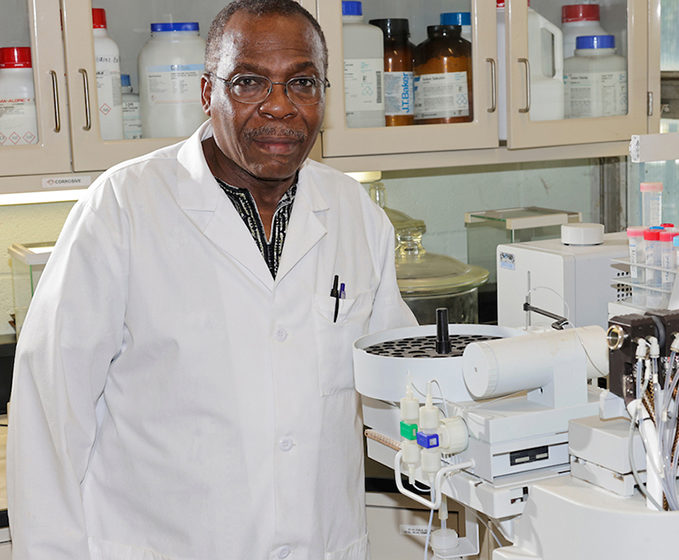FAMU Joins NSF Historic Partnership for Fertilizer Production

Texas Tech University will house the CASFER headquarters, while MIT, Georgia Tech and Case Western Reserve University are also partners. Professor Odemari Mbuya is the FAMU principal investigator.
Tallahassee, FL—Florida A&M University (FAMU) is one of five educational institutions joining the National Science Foundation (NSF) in a partnership to create the Engineering Research Center for Advancing Sustainable and Distributed Fertilizer Production (CASFER).
CASFER, which is headquartered at Texas Tech University in Lubbock, Texas, received a $26 million NSF grant for an initial five-year period with the possibility of renewing the grant for five more years and another $25 million. In addition to Texas Tech who will lead the collaborative center, FAMU is joined by Georgia Institute of Technology, Case Western Reserve University, and the Massachusetts Institute of Technology.
“FAMU is proud to be a key member of this partnership. This research project to create sustainable fertilizers, reflects on our core mission as a Land Grant institution to provide leadership in agriculture to address food insecurity worldwide while protecting our precious ecosystems,” said FAMU President Larry Robinson, Ph.D.
The FAMU team is led by co-principal investigator Odemari Mbuya, Ph.D., a professor of agricultural sciences and director of the Center for Water Resources in the College of Agriculture and Food Sciences (CAFS). Dean Robert W. Taylor, Ph.D., will serve on the Council of Deans for CASFER. Other FAMU scientists and engineers involved in CASFER are Katherine Milla, Ph.D., professor of geology and geospatial sciences in the Center for Water Resources; CAFS Associate Professor Daniel Solis, Ph.D., Amita Jain, Ph.D., research associate in the Center for Water Resources; and Tarek Abichou, Ph.D., professor of civil and environmental Engineering in the FAMU-FSU College of Engineering.
 (From left) Katherine Milla,Ph.D., Daniel Solis,Ph.D., Amita Jain, Ph.D., and Tarek
Abichou, Ph.D.
(From left) Katherine Milla,Ph.D., Daniel Solis,Ph.D., Amita Jain, Ph.D., and Tarek
Abichou, Ph.D.
CASFER Center Director, Gerri Botte , the Whitacre department chair of the TTU Department of Chemical Engineering in the Edward E. Whitacre Jr. College of Engineering, is tasked with leading a diverse team in developing next-generation, modular, distributed and efficient technologies for capturing, recycling and producing decarbonized nitrogen-based fertilizers (NBFs).
“The Engineering Research Center award is the most prestigious and difficult award to obtain from the National Science Foundation,” Botte said. “This is a tremendous opportunity to solve one of the largest problems in the world: how we feed the growing population while protecting and sustaining our environment.”
CASFER will create a transformative engineered system – modular, distributed, decarbonized nitrogen-based fertilizers production process – that takes the U.S. “from nitrogen linear pollution to a nitrogen circular economy (NCE),” and from a linear economy based on only economic growth to a circular economy with multidimensional growth: social, environmental, and economic. CASFER will deliver advanced and new technologies for the recovery and recycling of Nitrogen-Based Fuels (NBFs) using byproducts from untapped sources of waste such as Concentrated Animal Feeding Operations (CAFO) and municipal wastewater treatment plants (WWTP).
The vision of the CASFER Center is to “enable resilient and sustainable food production for the U.S. by developing next generation, modular, distributed, and efficient technologies for capturing, recycling, and producing decarbonized nitrogen-based fertilizers.”
More than 50 percent of the world’s population is supported by synthetic NBFs, though just 20 percent of NBFs produced translate into food. The other 80 percent are lost to the environment, creating serious environmental, health and socioeconomic impacts.
Mbuya said the project will focus on a different way of making fertilizer by removing nitrogen from animal waste and wastewater. A key resource is the City of Tallahassee Wastewater Plant, which produces about 26 million gallons of wastewater every day.
“We can remove the nitrogen from that wastewater to make fertilizer for crop production,” said Mbuya, who has taught at FAMU since 1996 and also has a teaching appointment at the University of Florida. For the last 100 years, the main method of manufacturing fertilizer is carbon and energy intensive, and requires high pressure and high temperatures. In Florida, fertilizer use leads to environmental pollution and algae blooms, Mbuya said.
“It’s not sustainable. We want to solve that,” Mbuya said. “If we are successful, this will be a major scientific innovation. It will have global implications.”
CASFER activities, technologies, and solutions will impact economic development and societal needs encompassing food, energy, and the environment. CASFER’s engineered system is a modular chemical reactor, which incorporates recent advances in nanotechnology, electrochemical science, and data sciences. The goal of CASFER’s engineering workforce development (EWD) is to train the next generation of engineers and technical workforce with the skills to advance the nitrogen circular economy considering sustainability within their own and global communities. EWD will also focus on creating agents of change and influencers targeting formal and informal education along the K-gray spectrum.
CASFER’s diversity and culture of inclusion activities will ensure that every participant can contribute to their fullest potential.
Since the inception of the program in 1985, the NSF has awarded fewer than 100 grants to open Engineering Research Centers (ERCs), which are designed to foster innovation and collaboration between industry leaders, government agencies and institutions of higher education.
“For decades, NSF Engineering Research Centers have transformed technologies and fostered innovations in the United States through bold research, collaborative partnerships and a deep commitment to inclusion and broadening participation,” said NSF Director Sethuraman Panchanathan. “The new NSF centers will continue the legacy of impacts that improve lives across the nation.”



